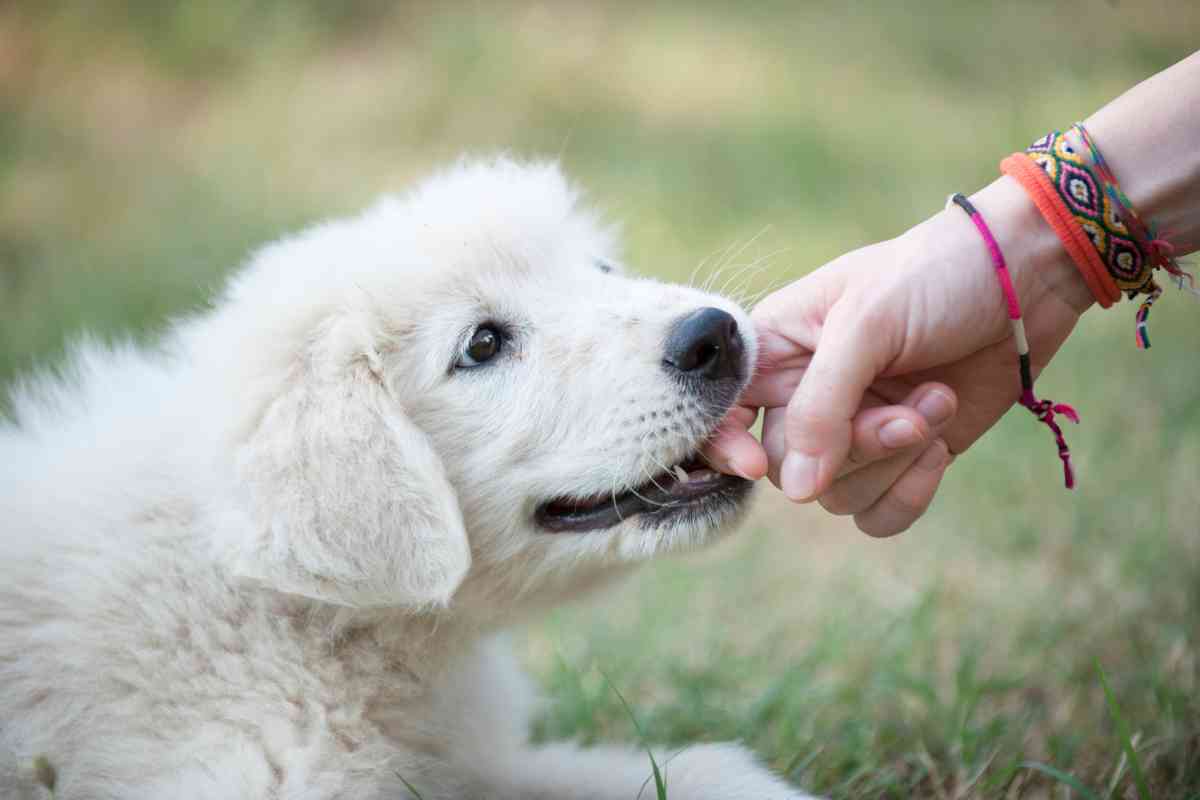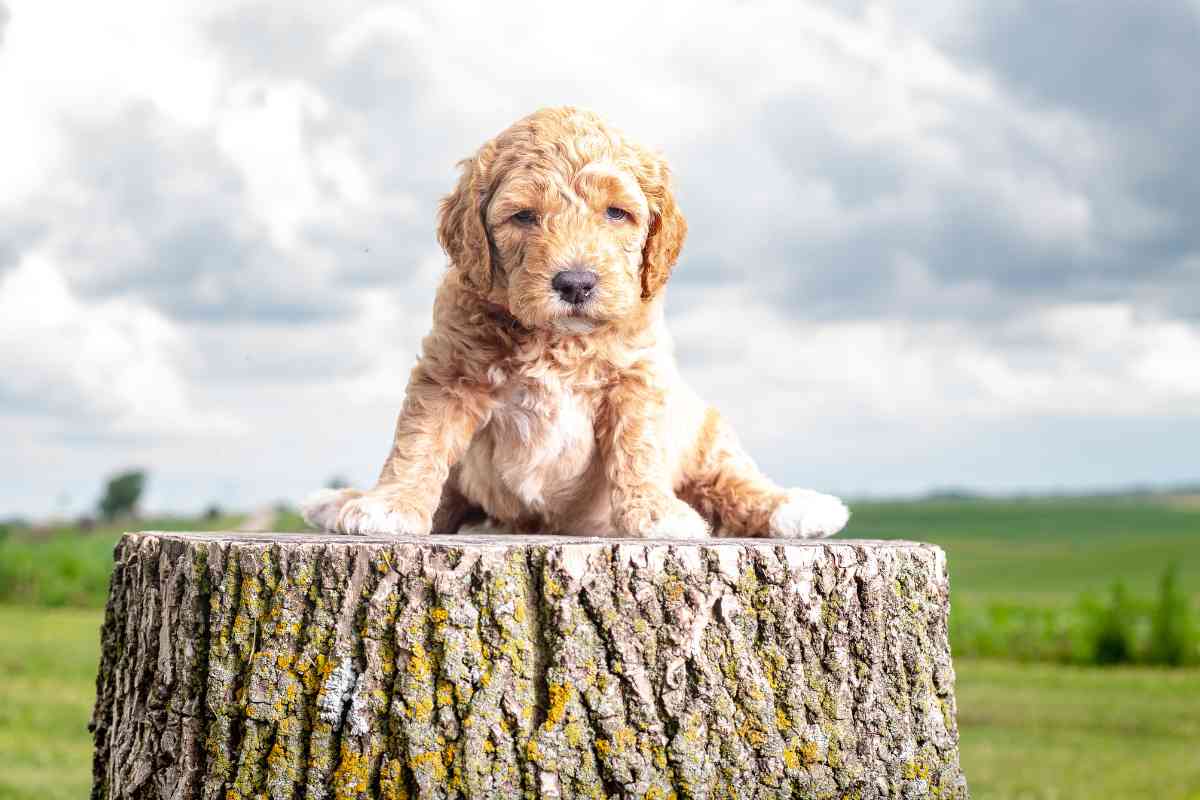Train Your Goldendoodle Puppy Not To Bite In 8 Easy Steps
Goldendoodle puppies are naturally playful and like to show love by biting, which can get annoying. So here is how to train a Goldendoodle puppy not to bite.

How do you train a Goldendoodle puppy not to bite?
To train your Goldendoodle puppy not to bite, teach them about bite inhibition, give them a time-out, and allow them to play with other dogs. You can also play no-contact games, exercise them, apply a taste deterrent, or get a trainer.
In our quest to know how to train a Goldendoodle not to bite, we sought help from different vets and dog trainers who gave us plenty of insight on how to go about it.
My Goldendoodle Bites So Much, Why?
Before diving into how to train your Goldendoodle puppy not to bite, it is imperative to comprehend why they do so. Understanding the root cause of the problem makes it easier to find a long-term solution.
Teething
At the age of 3 to 4 months, the puppy teeth begin to fall out as the adult teeth emerge. The growth of adult teeth is likely to cause severe discomfort, and the typical method used by puppies to relieve tension is to chew on nearby objects, including people.
Trying to Get Attention
Goldendoodles are extremely loving dogs who crave their owner’s attention. If the pup is attention deprived, they will do anything to get their owner’s attention, including negative behavior.
Never let your puppy feel like they are being abandoned or neglected.
Age
Puppy biting is fairly common, despite how unbelievable it might sound. Most puppies quit biting at 7 to 8 months when teething ceases. By this age, nearly all adult teeth have emerged, and you can expect a significant reduction in the desire to chew, bite, and nip.
How to Stop a Goldendoodle Puppy from Biting
After determining the most likely cause for your puppy’s biting tendency, here are a few precautions to take:
Give Your Goldendoodle Enough Attention
Puppies require significant attention, love, care, and reassurance that they are safe. If they feel like they are being ignored, pups will do anything to get their owners’ attention back, from biting or barking to running around.
Spend time with your pet whenever you can. Playing with your pet, taking a walk, or simply cuddling when you’re worn out. Spending time with your dog reduces your Goldendoodle’s tendency to bite and deepens your relationship. Through spending time with your puppy, you will learn them better. Get to know what works for them and what doesn’t since dogs are all different.
Teach Your Goldendoodle Bite Inhibition
Bite inhibition pertains to a pup’s ability to control how hard they bite. When a dog or puppy doesn’t have bite inhibition around people, even when playing, they bite too hard since they don’t realize how sensitive human skin is.
Young puppies generally learn biting inhibition when playing with other dogs. When dogs play together, there is a lot of chasing, pouncing, and wrestling. Sometimes a dog will bite a buddy excessively hard, and typically, the bite victim shouts and stops playing.
The shriek frequently catches the offender off guard, causing them to stop playing momentarily. Both teammates, though, shortly rejoin the play.
With this type of contact, puppies learn to regulate the force of their bites so that no one is wounded, and the play can proceed unhindered. The same lesson can be imparted to canines by people.
The following steps should be taken when the puppy bites too aggressively:
- Say “Ouch!” loudly to alarm the youngster
- Hold your hand to show you feel pain and also to stop the game
- Avoid immediately yanking your hand away because they may think you’re playing
- Take some time before resuming the game
- Repeat these steps if biting occurs again
Teaching your puppy to release a bite on command is another step in helping them learn bite inhibition. Choose a command phrase, like Let go and don’t stop until they do. You can make it a habit of rewarding the pup or praising them when they stop.
Give The Goldendoodle Time-out
A time-out is a punishment where you isolate your pup after doing something negative. While time-out is quite effective, only use it sparingly and when necessary.
Shut your dog in a room alone, lock the door, and let them stay there for about ten minutes. Ensure the room is puppy-proof to avoid any disaster in case of any rebelliousness. If you persist in using the time-out method as your Goldendoodle develops and learns better behavior, his biting tendencies should substantially reduce over a few weeks.
You won’t achieve great outcomes if you don’t apply this method consistently. It takes time to take effect. During the initial days of the new time-out lesson, you may give them more time-outs but reduce with time
Allow Your Goldendoodle To Play With Other Pups
Enabling your puppy to associate with other puppies is an easy method to help them learn acceptable behavior. If they are too boisterous, their playmates will depart, and they will quickly learn that biting spoils games.
Your Golden will have a lot of built-in energy if you shut them up and stop them from playing with their mates; this energy will manifest as them biting everyone, and they won’t ever learn that biting is bad manners.
Encourage Games And Sports That Require No Contact
Play games that do not require you to have contact, such as tug of war and fetch, instead of fighting and roughhousing with your hands. Tug-of-war can help you train them how to control their energy and anger.
These games help the puppies improve their motor skills, coordination, and other important life skills to help them become social, well-adjusted canines when they get older. Puppies naturally learn how to control their biting as they play.

Ensure Your Goldendoodle Gets Enough Exercise
Every dog needs constant exercise regardless of size, breed, or age. Your Goldendoodle needs to be exercised thrice to four times daily. This will assist in wearing your Goldendoodle, making them more responsive to your directions.
Exercise maintains your dog’s health and flexibility and prevents behavioral problems, including frequent barking, biting, licking, chewing, digging, and other anxiety-related tendencies. Additionally, it helps your dog grow in their self-assurance and trust in you and your environment.
Apply A Taste Deterrent
To prevent biting, taste deterrents make use of your pet’s aversion to bitter and hot flavors. Apply the deterrent on your body and clothing before engaging with your furry buddy. Stop all movement and wait for them to react to the deterrent’s foul taste when they bite you or your clothing.
Wear it for at least two weeks. After two weeks of getting a bad taste in their mouth whenever they bite you, your dog will probably learn to control their biting tendency.
Get A Trainer
If you’ve tried everything to get your puppy to stop biting, it might be time to speak to an experienced trainer. Trainers have advanced knowledge to help even the most stubborn puppies stop their negative behavior.
Remember, just because your puppy is more challenging to train doesn’t mean you failed. Instead, understand that seeking help is the correct action before the bite becomes a serious problem. Don’t be hesitant to get the help of a skilled dog trainer to handle the deeper problems.
What You Shouldn’t Do
Now that you know what you should do, here is what you shouldn’t do. Some popular suggestions are counter-productive.
Do Not Yell At Your Pup
Your tone and volume significantly impact your dog’s development and your relationship. Your dog may become anxious and afraid if you yell at them. Yelling also makes your dog less likely to obey your directions, which increases your frustration and likelihood of yelling even more.
Even if a dog’s bite could hurt, try to restrain yourself and show kindness. You may instruct your pooch by using a strong phrase like “stop” you mean they should stop biting.
Don’t Run Away
Your puppy may misunderstand you’re running away and you are still playing. Hold your position until they release, remove and give them a time-out or walk away limping.
Be Non-aggressive
Being aggressive will not assist you in showing your puppy who is in charge; rather, it will exacerbate their hostility. Be kind but also stern.
Don’t Make Your Golden Hold Their Tongue Or Force Them To Be Silent
Holding their tongue may make them bite themselves or get angrier and bite you harder. Avoid this strategy totally and choose any of the options provided above.
Don’t Give Your Puppy Treats When Training Them Not To Bite
Treats when training your puppy not to bite should be saved for the very end, as they need chewing. That may easily be interpreted as biting a puppy.
Don’t Spank Your Puppy
Dogs may bite even more vehemently if they are spanked or beaten for biting. They generally play more brutally in retaliation. Physical punishment might make your dog mistrust you and possibly even become hostile.
Don’t Stop Playing With Them Completely
Don’t stop playing with your dog after they bite during playing. Play strengthens the bond between a dog and their human family. Train your dog to play softly instead of never playing at all.
Key Takeaways
- Despite how absurd it may appear, puppy biting is extremely common. When teething stops at 7 to 8 months, most puppies stop biting.
- A simple way to assist your puppy in learning appropriate behavior is to let them interact with other puppies.
- Being harsh won’t help you establish your dominance over your puppy; on the contrary, it will make them more hostile. Be compassionate but firm.